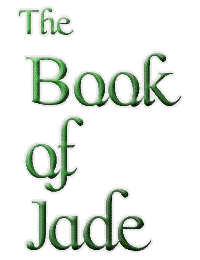
Now at the last, Zulaikha, all my sorrows olden
Are farther off than Europe or than China seem,
And like an idle dream
The North is faded far off in the distance golden;
And here with thee I sit in perfect peace enfolden
Beside the Ganges-stream.
Full well I knew that ne'er those northern promontories
Could give to me the dream that did my soul desire;
For there my heart did tire;
For always me allur'd the strangely whisper'd stories
Of skies that burn with more consuming languid glories,
And suns of mightier fire.
I dream'd of heavier suns than burn in skies of ours,
And heavier airs that through the long long evening swoon
Under a larger moon,
And heavier-scented gardens fill'd with stranger flowers,
And tropic palms that wave through all the long long hours
Of endless afternoon.
At last now from that northern dream arn I awoken,
At last I am come home over the watery main;
Long long I sigh'd in vain;
Now under tropic palms I lie in peace unbroken,
And mine own land I see, beloved, and hear spoken
My natal tongue again.
Zulaikha, past is all the longing and endeavour;
The palm-trees sleep, and sleeping move not any leaf;
Perisht is woe and grief;
Stilly the padmas float upon the holy river;
Among all these we two with languid eyes forever
Lie sunk in endless kief.
Before us riseth white our marble-builded palace;
Thou hast let fall from out thy hands that weary are
The volume of Attar.
Thy hand hath spill'd the wine within the silver chalice;
Upon the river winding through the distant valleys
Sleepeth the nenufar.
From out the oleanders languid slumber steepeth,
And thou, Zulaihka, dost, in rest too deep for dream,
Like one enchanted seem;
Thy beauty now in waking slumber sunken sleepeth,
And dreaming past thy wholly closed eyelids creepeth
The sleepy-flowing stream.
Thou hast the light of Asia in thy face divinest,
And in thy scented mouth and in thy lotus-eyes,
O wine of Paradise!
O moon-fac'd love that by the sacred stream reclinest,
Hath this world anything for which in vain thou pinest?
That thing shall be thy prize.
The caravans that in the desert, heavy-laden,
By unknown oases pitch their sun-blacken'd tents,
Shall bring thee all sweet scents
Wherein delight in heaven the houris ever-maiden
Patchouli, nard, and myrrh, from many a distant aden
Of heavenly indolence.
All kinds of gems wherefore thine almond eyes have yearning,
In heaps, wherein to bathe thy beauties languorous,
O maiden amorous,
They shall bring home to thee from distant isles returning—
Pearl, sapphire, diamond, topaz, and ruby burning,
And opal luminous.
Thou art that sweet whereof all poets dead have chaunted,
Therefore my soul hath sought thy face o'er pathless seas,
Here to have endless peace;
Thou art the garden of delight with slumber haunted,
Thy perfume maketh dream of desert lands enchaunted,
And far-off oases.
Thou hast that beauty in thine all-consuming glances
That openeth the ways to far enchanted skies,
And in thy lotus-eyes
Thou hast the light that shineth in the countenances
Of them whose eyes have seen the glory which entrances
The blest of Paradise.
Thou art all sweets that unto perfect joy devote us,
In thee all spices and all scents together come,
O lute that now art dumb!
Thou art musk, frankincense, amomum, stephanotis,
Thou art the fragrant wine, the paradisal lotus,
Thou art the opium.
Hashsheesh nor opium are worth not thy caresses,
Sweeter than opium to still the spirit's drouth
Thine unassuaged mouth;
Him that hath known thy love no mortal grief distresses;
Sweeter thy kisses are than incense which oppresses
The breezes of the South. . .
At last I am come home, come home; and all regretting
Is with the North afar from thee and me away.
Behold O love, the day
Is past, in Indian skies the holy sun is setting;
The muzin from his tower calleth unforgetting,
The faithful ones to pray.
Under the velvet night wide India reposes
Now in the scented dark the champak odours swoon;
Slowly the summer moon
Riseth into the azure night made drunk with roses;
And lo the camel-bells, now that the daylight closes,
Tinkle their quiet tune.
Behold, O well-beloved, 'neath the moonlight gleaming
The travellers depart from out the sleeping khan,
O perfume Asian!
And past the moonkt palace, where we two lie dreaming,
With camels and with horsemen like to shadows seeming
Departs the caravan.
It is the starting hour, O most melancholy!
In long procession underneath the moon's pale gleams,
Like something that but seems,
The caravan departeth to the desert slowly,
There far afar to seek through endless time the holy
Mirages of their dreams.
Content © 2007 - 2008 The Book of Jade
Design © 2007 -2008 Thaumaturgic: Web Development